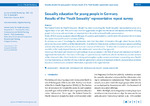Sexuality education for young people in Germany. Results of the ‘Youth Sexuality’ representative repeat survey
Scharmanski, Sara
Hessling, Angelika
The Federal Centre for Health Education (BZgA) has been conducting the ‘Youth Sexuality’ representative survey on a
regular basis since 1980. This continuous monitoring generates insights into the sexual and reproductive health of young
people in Germany and constitutes an important basis for evidence-based health communication.
A total of N=6,032 young people between the ages of 14 and 25 participated in a combination of oral and written interviews
(Computer Assisted Personal Interviews (CAPI)).
As primary sources of knowledge for, adolescents state that they obtain information through school lessons (69%),
personal discussions (68%), and the Internet (59%). In addition to these sources, professional gynaecological counselling
and sexuality education at home are also important sources of information. To what extent trusted contact persons are
available in the family depends heavily on the adolescents’ sociocultural backgrounds.
Providing information and disseminating knowledge to young people in the field of sexual and reproductive health is
organised intersectorally in Germany. In this way, it is possible to also reach those who do not have any contact persons
at their disposal in their direct family. Maintaining and strengthening the current commitment in promoting sexual health
is of key importance, as only this will ensure the next generation’s sexual and reproductive health, and provide an evidencebased
counterbalance to anecdotal information, especially in the digital domain.
Dateien zu dieser Publikation

